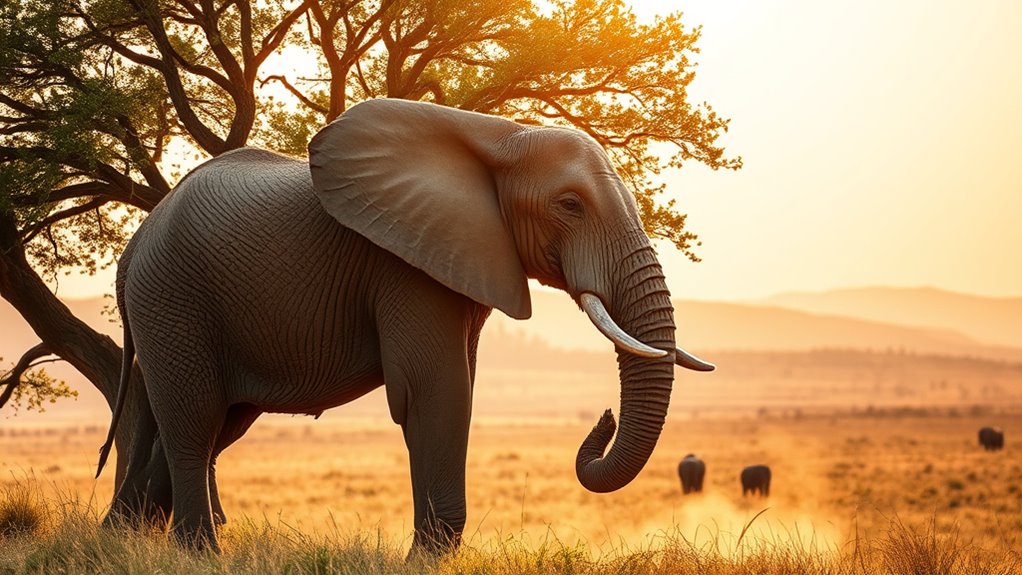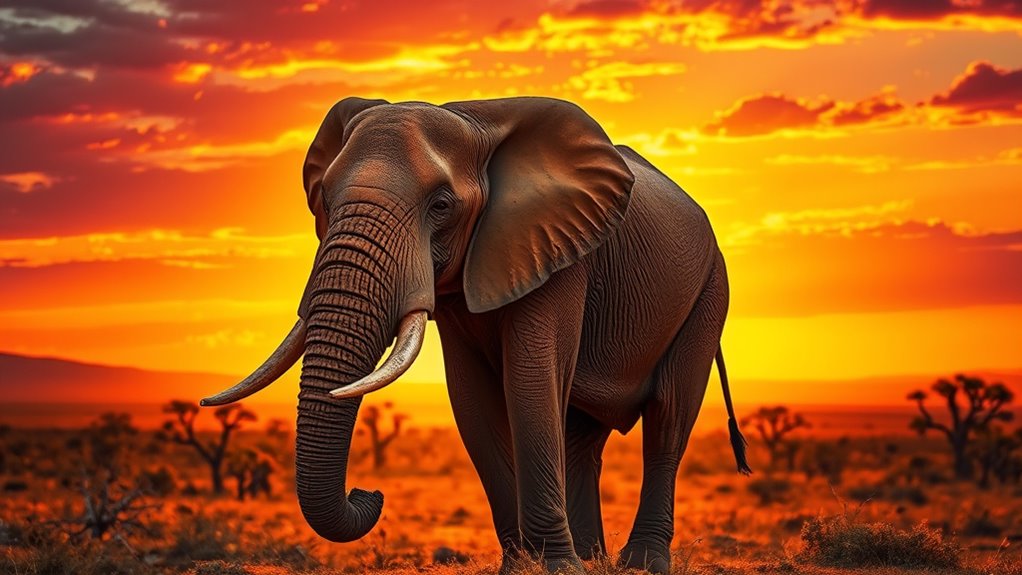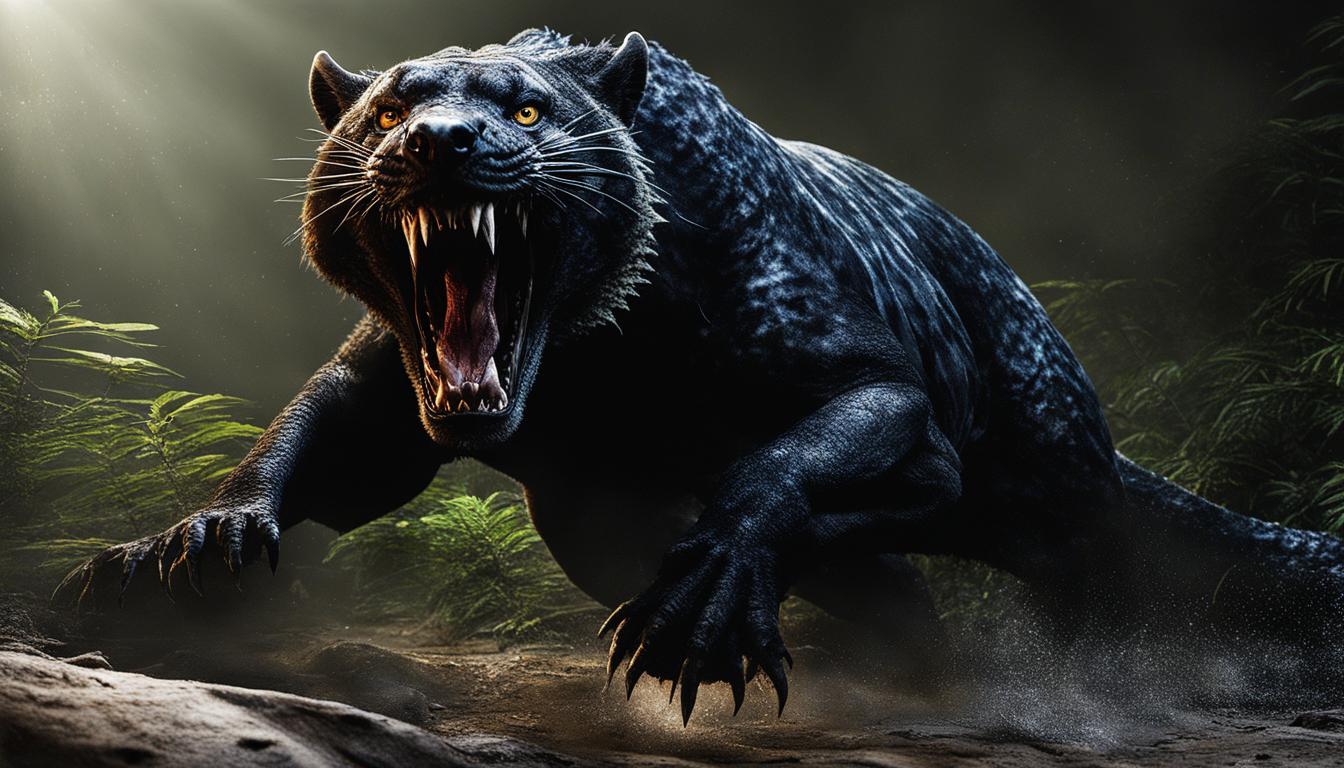Elephants usually live between 60 and 70 years in the wild, although some can exceed that age. Their lifespan reflects their adaptability and resilience to environmental challenges. Factors like habitat quality, diet, and social structures all play a vital role in their longevity. Human activities, such as poaching and habitat loss, can threaten these majestic creatures. There’s so much more to discover about what influences their lives and how we can help.
Key Takeaways
- Elephants typically live between 60 to 70 years in the wild, with some individuals surpassing this age range.
- Lifespan is influenced by habitat quality, diet, and nutrition, as well as environmental threats.
- Social structures play a crucial role, with matriarchs guiding younger members and enhancing survival chances.
- Human activities, such as poaching and habitat loss, can significantly shorten elephant lifespans.
- Conservation efforts are essential for preserving habitats and ensuring healthier, longer lives for elephants.

Elephants are incredible creatures, and their lifespan often sparks curiosity. Generally, elephants live for about 60 to 70 years in the wild, although some individuals can exceed this range. Their longevity is a testament to their adaptability and resilience in various environments. However, several factors can influence how long an elephant lives, including habitat, diet, and threats from human activities.
Elephants typically live 60 to 70 years in the wild, showcasing their remarkable adaptability and resilience.
In the wild, elephants face numerous challenges that can shorten their lives, such as poaching and habitat loss. As you learn about their lifespan, it’s essential to consider the role of elephant conservation and wildlife protection in ensuring these majestic animals can thrive. Without effective conservation efforts, the future of elephants could be grim. By supporting wildlife protection initiatives, you’re helping to create a safer environment for elephants, which can significantly impact their lifespan.
Elephants live in matriarchal herds, where older females lead and guide younger members. This social structure is vital for their survival and longevity, as older elephants share knowledge about food sources, water, and migration routes. When you think about elephant conservation, consider how preserving their social structures can contribute to their long-term well-being. Protecting their habitats ensures that these social bonds remain intact, allowing elephants to live longer, healthier lives.
The diet of an elephant also plays a crucial role in its lifespan. Elephants are herbivores, consuming a wide variety of plants, leaves, and fruits. Their natural foraging behaviors are essential for maintaining ecological balance. By promoting wildlife protection, you’re helping to safeguard the diverse habitats that elephants rely on for food. Without adequate resources, elephants may struggle to find the nutrition they need, ultimately affecting their lifespan.
Moreover, elephants are known to develop strong emotional bonds with one another. They experience grief, joy, and even stress, much like humans. As you reflect on the importance of elephant conservation, think about the emotional lives of these creatures and how they are affected by human interference. When their environments are disrupted or fragmented, it can lead to stress and decreased life expectancy.
Ultimately, understanding how long elephants live is intertwined with the efforts we make toward conservation and protection. By engaging in wildlife protection initiatives, you’re not only contributing to the survival of elephants but also ensuring that future generations can appreciate these magnificent beings for years to come. Every action counts, and together, we can help extend the lifespans of these incredible animals.
Frequently Asked Questions
Do Elephants Have Different Lifespans in the Wild Versus Captivity?
Yes, elephants do have different lifespans in the wild versus captivity. In the wild, their social structures and migration patterns play a vital role in their health and longevity. They often face threats like poaching and habitat loss, impacting their lifespan. In captivity, you might see longer lifespans due to consistent care and absence of predators, but it can also lead to health issues related to stress and limited social interactions.
What Are the Major Threats to Elephant Longevity?
Major threats to elephant longevity include habitat destruction and poaching. When you think about habitat loss, it’s often due to human activities like agriculture and urban development, which reduces their living space. Poaching, driven by the demand for ivory and other body parts, poses a direct threat to their survival. By understanding these issues, you can appreciate the need for conservation efforts to protect these majestic creatures and guarantee their future.
How Do Elephants’ Lifespans Compare to Other Large Mammals?
Elephants generally live longer than many large mammals, often reaching up to 60 years in the wild. Their complex social structures and strong family bonds contribute to their longevity, as they rely on each other for support and protection. Unlike some large mammals that have shorter lifespans, elephants exhibit unique migration patterns that enhance their survival, allowing them to access resources and adapt to environmental changes more effectively.
Can Diet and Care Affect an Elephant’s Lifespan?
Absolutely, diet and care substantially affect an elephant’s lifespan. Proper elephant nutrition, including a balanced diet rich in fruits, vegetables, and minerals, can enhance their overall health. When you implement effective care practices, such as regular veterinary check-ups and a safe environment, you help prevent diseases. By prioritizing these aspects, you’re not just extending their life, but also improving their quality of life, allowing them to thrive in their habitat.
What Are the Signs of Aging in Elephants?
You might notice signs of aging in elephants as early as their 40s. Common indicators include worn-down tusks, changes in skin texture, and reduced social interaction. As elephants age, their social behavior often shifts; they become less dominant and may withdraw from herds. Additionally, older females may experience irregular reproductive cycles, reflecting their declining fertility. Understanding these signs helps you appreciate the complexities of elephant life and their social structure.
Conclusion
So, now you know that elephants can live up to 60-70 years in the wild, but some even reach their 80s in captivity. Isn’t it fascinating to think that they might hold onto cherished memories for decades? There’s a theory that their long lives give them wisdom, making them the gentle giants we admire. Next time you see an elephant, remember: you’re looking at a creature with a lifetime of stories waiting to be shared.










